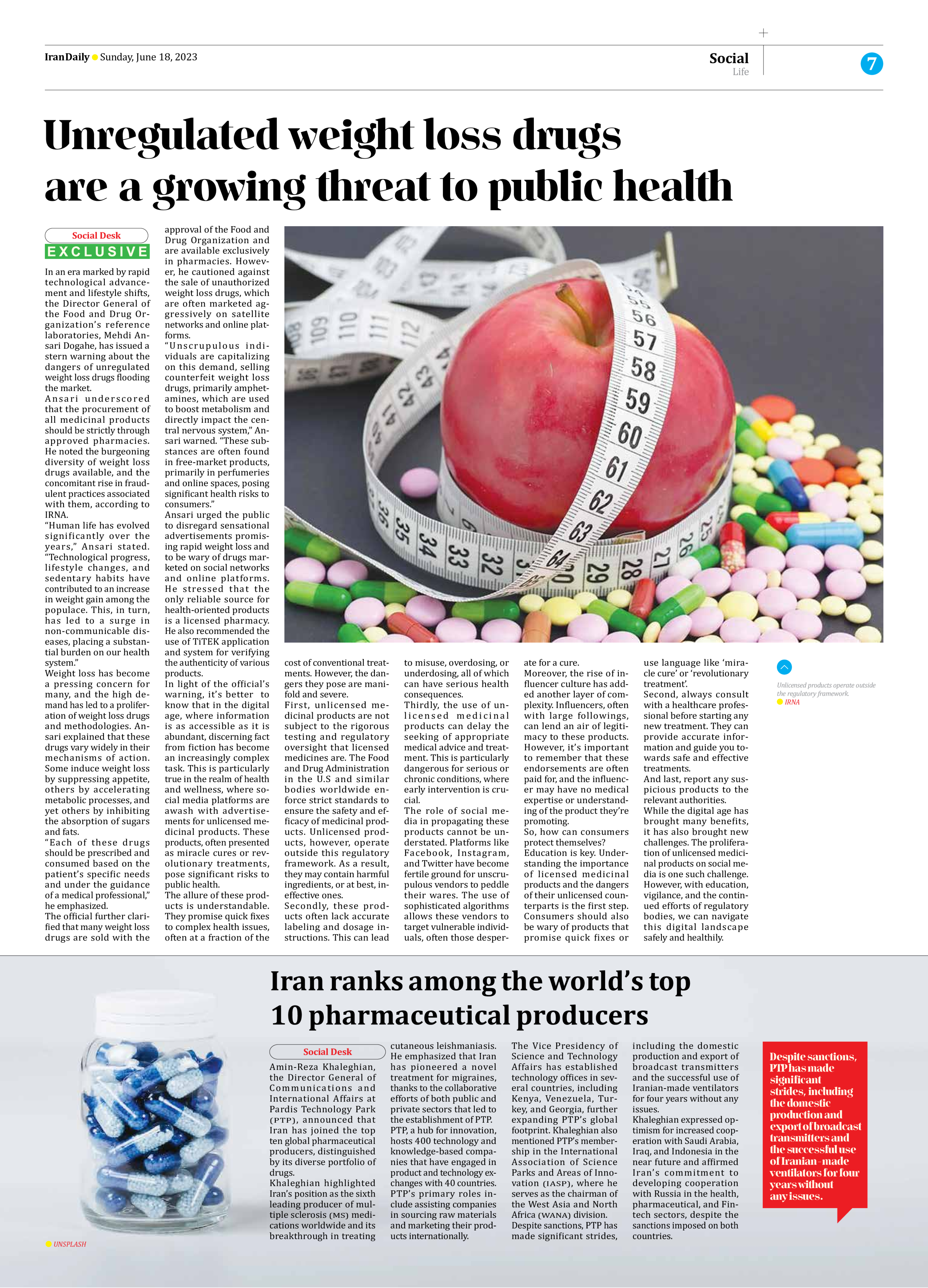
Unregulated weight loss drugs are a growing threat to public health
In an era marked by rapid technological advancement and lifestyle shifts, the Director General of the Food and Drug Organization’s reference laboratories, Mehdi Ansari Dogahe, has issued a stern warning about the dangers of unregulated weight loss drugs flooding the market.
Ansari underscored that the procurement of all medicinal products should be strictly through approved pharmacies. He noted the burgeoning diversity of weight loss drugs available, and the concomitant rise in fraudulent practices associated with them, according to IRNA.
“Human life has evolved significantly over the years,” Ansari stated. “Technological progress, lifestyle changes, and sedentary habits have contributed to an increase in weight gain among the populace. This, in turn, has led to a surge in non-communicable diseases, placing a substantial burden on our health system.”
Weight loss has become a pressing concern for many, and the high demand has led to a proliferation of weight loss drugs and methodologies. Ansari explained that these drugs vary widely in their mechanisms of action. Some induce weight loss by suppressing appetite, others by accelerating metabolic processes, and yet others by inhibiting the absorption of sugars and fats.
“Each of these drugs should be prescribed and consumed based on the patient’s specific needs and under the guidance of a medical professional,” he emphasized.
The official further clarified that many weight loss drugs are sold with the approval of the Food and Drug Organization and are available exclusively in pharmacies. However, he cautioned against the sale of unauthorized weight loss drugs, which are often marketed aggressively on satellite networks and online platforms.
“Unscrupulous individuals are capitalizing on this demand, selling counterfeit weight loss drugs, primarily amphetamines, which are used to boost metabolism and directly impact the central nervous system,” Ansari warned. “These substances are often found in free-market products, primarily in perfumeries and online spaces, posing significant health risks to consumers.”
Ansari urged the public to disregard sensational advertisements promising rapid weight loss and to be wary of drugs marketed on social networks and online platforms. He stressed that the only reliable source for health-oriented products is a licensed pharmacy. He also recommended the use of TiTEK application and system for verifying the authenticity of various products.
In light of the official’s warning, it’s better to know that in the digital age, where information is as accessible as it is abundant, discerning fact from fiction has become an increasingly complex task. This is particularly true in the realm of health and wellness, where social media platforms are awash with advertisements for unlicensed medicinal products. These products, often presented as miracle cures or revolutionary treatments, pose significant risks to public health.
The allure of these products is understandable. They promise quick fixes to complex health issues, often at a fraction of the cost of conventional treatments. However, the dangers they pose are manifold and severe.
First, unlicensed medicinal products are not subject to the rigorous testing and regulatory oversight that licensed medicines are. The Food and Drug Administration in the U.S and similar bodies worldwide enforce strict standards to ensure the safety and efficacy of medicinal products. Unlicensed products, however, operate outside this regulatory framework. As a result, they may contain harmful ingredients, or at best, ineffective ones.
Secondly, these products often lack accurate labeling and dosage instructions. This can lead to misuse, overdosing, or underdosing, all of which can have serious health consequences.
Thirdly, the use of unlicensed medicinal products can delay the seeking of appropriate medical advice and treatment. This is particularly dangerous for serious or chronic conditions, where early intervention is crucial.
The role of social media in propagating these products cannot be understated. Platforms like Facebook, Instagram, and Twitter have become fertile ground for unscrupulous vendors to peddle their wares. The use of sophisticated algorithms allows these vendors to target vulnerable individuals, often those desperate for a cure.
Moreover, the rise of influencer culture has added another layer of complexity. Influencers, often with large followings, can lend an air of legitimacy to these products. However, it’s important to remember that these endorsements are often paid for, and the influencer may have no medical expertise or understanding of the product they’re promoting.
So, how can consumers protect themselves?
Education is key. Understanding the importance of licensed medicinal products and the dangers of their unlicensed counterparts is the first step. Consumers should also be wary of products that promise quick fixes or use language like ‘miracle cure’ or ‘revolutionary treatment’.
Second, always consult with a healthcare professional before starting any new treatment. They can provide accurate information and guide you towards safe and effective treatments.
And last, report any suspicious products to the relevant authorities.
While the digital age has brought many benefits, it has also brought new challenges. The proliferation of unlicensed medicinal products on social media is one such challenge. However, with education, vigilance, and the continued efforts of regulatory bodies, we can navigate this digital landscape safely and healthily.







